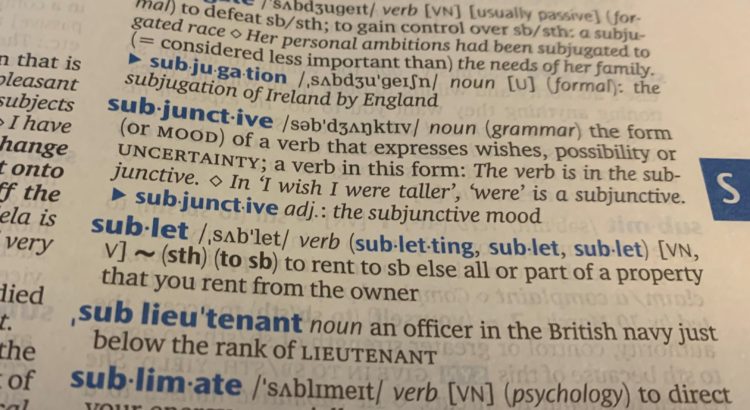(Level B2 and above: On the subjunctive, with examples, phrases and video)
Written and compiled by Benedicte Gravrand, English trainer at The Language House in Geneva
In the 20th century, British English tried to avoid using the subjunctive, seeing it as old and pedantic, and promoted the use of “should” instead. But thanks to American English which kept the subjunctive alive and well, the use of “should” has declined on the islands as the subjunctive has returned.
Brian: How was your meeting with management?
Andrew: It went well. My advice was that the company invest in new equipment and make savings elsewhere.
B: Did you recommend that they streamline the staff on the shop floor?
A: Well, I suggested that the team there be better paid and that no new hire be made.
B: Heaven forbid. Asking that they be better paid? How will the company afford it?
A: I think it is essential that the company show the team how valuable they are.
B: Be that as it may, it is also important that we pay the gas bill too!
A: About that, I also insisted that savings be made elsewhere.
B: Where?
A: You’re fired.
B: I should have seen that coming. So be it.
The subjunctive is a special kind of present tense, also called a mood, used in the formal style. It has no -s in the third person singular – the verb (in blue) is in its bare form.
It is used to express wishes and possibilities (I wish I were rich) and in that-clauses (I suggest that you stay here) after words which express the idea that something is important or desirable (in red above). For example; suggest, recommend, ask, insist, vital, essential, important, desirable, advice, best.
In fact, you use the subjunctive in French in very similar expressions: Que tout le monde soit heureux ! (wish) Il faut que tu apprennes ta leçon (necessity).
The verb be, as usual, is treated differently. It is be in the present/future form: It is important that Helen be present when we sign the papers. And were in the present/past form; I wish it were Saturday.
Other titbits: The subjunctive uses the same form in both present and past sentences (except with be). And we don’t use do not/don’t: We considered it desirable that he not leave school now.
To subscribe to our blog, leave your email address
(right-hand side column – or at the bottom
of this blog if you are using a smartphone) and
confirm your subscription when you receive our email
Phrases
We can see the subjunctive in some common fixed phrases (known as formulaic subjunctive):
- Far be it from me to criticize, but aren’t you being a little unreasonable? (I don’t want to criticise but I am doing it anyway.)
- Heaven help us if there’s a fire (I hope this will not happen). Also: Heaven forbid.
- God save the Queen (UK’s national anthem)
- God bless America / God bless you (I care about you)
- Long live the bride and groom / Long live the king (wishing them a long life)
- He’s a sort of adopted uncle, as it were (in a way)
- Be that as it may, I still think Mr Livingstone is the best man for the job (whether this is true or not)
- If you’ve really decided to quit the music business, then so be it (we can’t do anything about it)
In the 20th century, British English tried to avoid using the subjunctive, seeing it as old and pedantic, and promoted the use of “should” instead. But according to The Economist, thanks to American English which kept the subjunctive alive and well, the use of “should” has declined on the islands as the subjunctive has returned.
In short, in the UK, you will still hear:
- It is important that every child should have the same educational opportunities
And:
- It is important that every child has the same educational opportunities
But as the old subjunctive is coming back into fashion, you will also hear:
- It is important that every child have the same educational opportunities
Video:
Hunting for the subjunctive
Vocabulary:
- Streamline: to improve a business, organization, process, etc by making it more modern or simple
- Bare: (in this context) basic, with nothing extra: Readers want more than just the bare facts.
- Pedantic: giving too much importance to details and formal rules, especially of grammar
- Decline: to become less or worse: The number of people buying their own homes has declined.
- Still: (in this context) used for saying that a situation continues to exist: Her hair was still damp from her walk in the rain.
- Titbit: a piece of interesting information: titbits of gossip.


